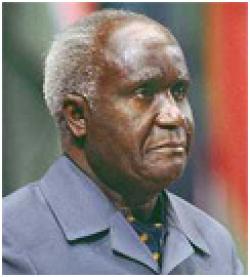
Published date
6 December 1977
Kenneth David Kaunda was considered a key figure in the continuing conflict between Zimbabwean liberation movements and Ian Smith's Rhodesia. Zambia offered military bases for both Robert Mugabe's Zimbabwe African National Union (ZANU) and Joshua Nkomo's Zimbabwe African People Union (ZAPU). However, following the assassination of Hebert Chitepo in Lusaka in 1975, ZANU and its military wing, Zimbabwe African National Liberation Army (ZANLA) under the leadership of Josiah Tongogara, grew suspicious of Kaunda and left Zambia to seek asylum in Mozambique in 1976. .
Once safely ensconced in Mozambique, ZANLA increased the number of attacks on Rhodesia, engaging Smith's forces along the eastern frontier for much of 1977. ZAPU continued to launch its attacks on the western border, with bases in Zambia. It was these attacks during 1977 that forced Smith to agree to talks at the end of 1977. But these talks involved moderates in Zimbabwe, excluding ZANU and ZAPU. Abel Muzerewa, Ndabaningi Sithole and James Chikerema, all moderate nationalists in the resistance movement, signed an agreement that was to be known as 'Internal Settlement' on 3 March 1978.
The exclusion of ZANU and ZAPU meant that the 'war' continued. Edgar Tekere, ZANU's firebrand Executive Committee member declared 1978 'the year of fire and brimstone' (Quoted in Source?). And as attacks into Rhodesia increased in intensity and frequency during 1978, South Africa, the US and Britain put pressure on Smith to enter into meaningful talks that would include ZANU and ZAPU. These talks were to begin in the second half of 1979, concluding in the famous Lancaster House Agreement brokered by Britain's Lord Carrington, leading to Zimbabwe's independence in 1980.
References
Mazrui, A (ed) General History of Africa, "Africa Since 1935", p.271|Josiah Tongogara from Wikipedia [online] available at: wikipedia.org/ [accessed on 30 November 2010]|Chimhashe, T (2009). Tekere absolves Mugabe of Tongogara's Killing available at: www.newzimbabwe.com/pages/tekere2.15810.html (on line) [accessed on 30 November 2010]